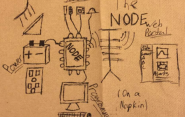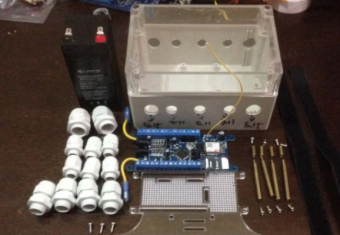The NODE: From the CEID to Zimbabwe to China - and Back Again

A data-transmitting device created at the Center for Engineering Innovation & Design to collect and send vital information in remote, is getting ready for real-world testing.
 Gordon McCambridge, who graduated in May, and is now a Gordon Grand Fellow, spent the last several months improving the device he and Tayo Ajayi ('15) have dubbed The NODE. Their invention is a low-cost data-monitoring device with cell phone capability designed specifically for remote data collection in off-the-grid environments. It can, for instance, monitor the temperature and position of a vaccine shipment, or determine the power coming from a solar panel array.
Gordon McCambridge, who graduated in May, and is now a Gordon Grand Fellow, spent the last several months improving the device he and Tayo Ajayi ('15) have dubbed The NODE. Their invention is a low-cost data-monitoring device with cell phone capability designed specifically for remote data collection in off-the-grid environments. It can, for instance, monitor the temperature and position of a vaccine shipment, or determine the power coming from a solar panel array.
Earlier this month, McCambridge and Ajayi became incorporated as Pivot Technologies LLC. This week, they filed a patent for The NODE.
When they presented the device in August as part of their CEID summer fellowship, McCambridge said, "it was pretty much a circuit board in a box." With more work over the last several months - first in Zimbabe, then in China - it's a much more complete system. The device now features weatherproof housing, cable glands, and a sealed lead acid battery. With improvements in power management, McCambridge said, the system should operate for a full month without recharging.
Working with Econet Wireless, a telecommunications group founded in Zimbabwe, he tested the device against ones currently in use.
"The goal was to take one of the original units and install it in one of the villages - essentially take this system and put it next to another and compare the two," he said. The NODE worked at least as well, at a cheaper cost, and they were able to identify a problem in the region.
 "One thing you realize when you get to Zimbabwe is that the cell phone networks occasionally die, and it's related to power failure," he said. "The key realization there was that we have to figure out how to deal with that problem."
"One thing you realize when you get to Zimbabwe is that the cell phone networks occasionally die, and it's related to power failure," he said. "The key realization there was that we have to figure out how to deal with that problem."
He then took the device to Shenzhen, China – where it's much easier to find parts and equipment (he spent a day in Zimbabwe looking for a hand drill).
"I had a really great two-month experience," he said. "I started prototyping again – I started over from scratch, making circuit boards. I made about five iterations of the circuit board in probably three weeks. In the U.S. it takes two weeks and $100 to get a circuit board. In China I was getting boards in four days for $25."
Making the NODE low-cost and accessible is crucial to the project. After having the opportunity to work with factories and suppliers in Shenzhen, he's confident that the Node can be sold for less than $100.
Now, back in the U.S., McCambridge said he's switching hats from engineering to business, and seeking funding for The NODE. Ajayi, now in graduate school at Rice University, is also working on finding investors.
McCambridge said there are a few routes they may take. One possibility is finding one or a few big investors. Another is finding lots of small investors via Kickstarter. He's also talking with some people in Haiti who are interested in working with Pivot Technologies to pilot the devices.
"Now we have these new units, we'd like to get them out in the field and prove to the world that they work and can be really useful," he said.

